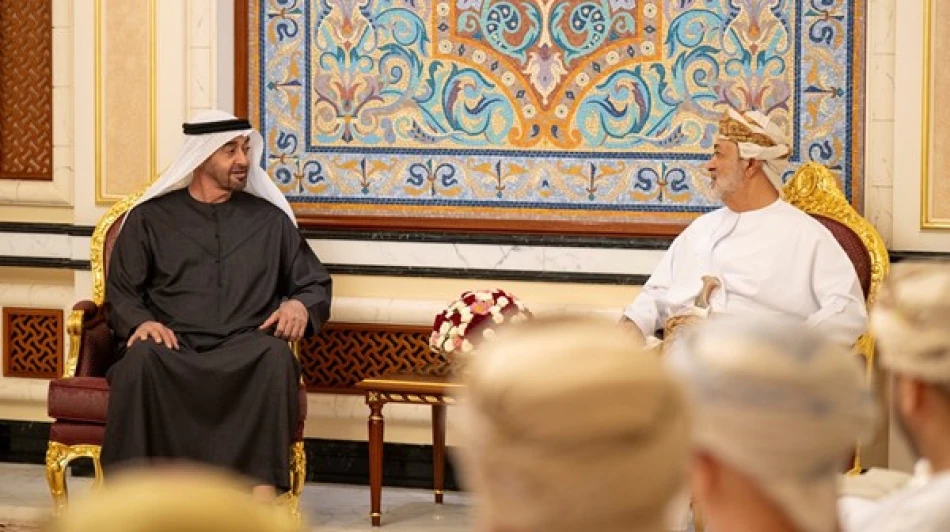
UAE President and Oman Sultan Discuss Bilateral Ties, Regional Developments in Salalah
UAE and Oman Leaders Strengthen Regional Alliance Amid Growing Security Challenges
UAE President Sheikh Mohamed bin Zayed Al Nahyan and Oman's Sultan Haitham bin Tarik have reaffirmed their nations' strategic partnership during a high-level meeting in Salalah, focusing on deepening bilateral cooperation while jointly condemning recent Israeli aggression against Qatar. The fraternal visit underscores the Gulf states' coordinated response to mounting regional tensions and their commitment to collective security frameworks.
Diplomatic Unity in Turbulent Times
The meeting at Al Husn Palace in Salalah highlighted the enduring strength of UAE-Oman relations, built on decades of strategic alignment since the founding fathers Sheikh Zayed bin Sultan Al Nahyan and Sultan Qaboos bin Said established the framework for cooperation. Both leaders emphasized their shared commitment to advancing Gulf Cooperation Council integration at a time when regional stability faces unprecedented challenges.
The timing of this diplomatic engagement is particularly significant, coming as Gulf states navigate complex geopolitical dynamics involving Iran, Israel, and shifting global energy markets. The UAE and Oman's coordinated stance reflects a broader Gulf strategy of maintaining unified positions on key regional issues while pursuing individual economic diversification goals.
Economic Cooperation Takes Center Stage
Beyond political alignment, the leaders discussed expanding their nations' economic partnership across multiple sectors. This cooperation is especially valuable given both countries' ambitious Vision 2030-style development programs and their roles as regional trade and logistics hubs.
Oman's strategic position controlling the Strait of Hormuz complements the UAE's status as the Middle East's financial and business capital. Together, they form a crucial economic corridor that handles significant portions of global energy exports and regional trade flows. Enhanced cooperation between these nations could strengthen supply chain resilience and create new opportunities for foreign investment.
Collective Response to Regional Aggression
The leaders' strong condemnation of Israeli actions against Qatar demonstrates the Gulf states' evolving approach to regional security. Despite the Abraham Accords normalizing UAE-Israel relations, the UAE continues to prioritize Gulf solidarity when member states face external threats.
This balanced diplomatic approach reflects the UAE's sophisticated foreign policy strategy: maintaining beneficial relationships with Israel while upholding commitments to Gulf unity. For Oman, which has historically maintained diplomatic channels with all regional players, supporting Qatar aligns with its traditional role as a regional mediator.
Strategic Implications for Gulf Cooperation
The emphasis on strengthening GCC frameworks signals renewed momentum for Gulf integration after years of internal divisions, particularly the Qatar blockade that ended in 2021. Both leaders recognized that enhanced cooperation serves their nations' development aspirations while creating a stronger collective response to regional challenges.
This diplomatic engagement also reinforces the UAE and Oman's positions as moderate voices within the Gulf, capable of building bridges between different regional factions while maintaining their core strategic interests. Their partnership provides a stabilizing influence in an increasingly volatile regional environment.
The high-level delegations accompanying both leaders, including key ministers and royal family members, demonstrate the comprehensive nature of UAE-Oman cooperation spanning defense, foreign policy, economic development, and cultural exchange. This institutional depth suggests their partnership will continue strengthening regardless of changing regional dynamics.
Most Viewed News

 Layla Al Mansoori
Layla Al Mansoori






